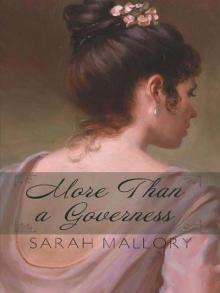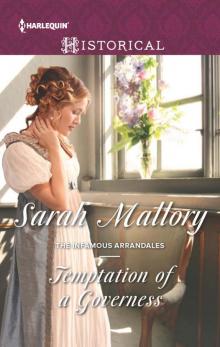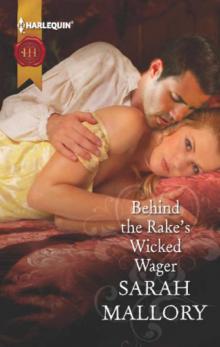Cinderella and the Scarred Viscount, page 1





“My eldest daughter, Lord Austerfield.”
The Viscount had his back to Carenza, but she did not miss the slight straightening of his body, indicative of surprise. So, he had not been told there was another unmarried daughter at home. If he had noticed her at all as he entered, he probably thought her a poor relation, not worthy of attention.
He was gazing at his host and he said now, a trifle uncertainly, “Miss, er, Bettridge?”
Carenza felt no sympathy for the Viscount’s embarrassment. If he could not bestir himself to learn something of his hosts before descending upon them, then he deserved none.
“That’s it, my lord,” her father said.
Carenza quickly schooled her face into an expression of polite welcome, but as the Viscount turned toward her, the smile froze on her lips.
In contrast to the right side of his face, the left was disfigured by a web of scars that stretched from the temple to his jawline and beyond.
“Miss Bettridge, I am delighted to meet you.”
He bowed, apparently indifferent to his appearance, but when he straightened, Carenza noticed that his eyes were wary. Her animosity disappeared and she wanted only to put him at ease. She gave him her friendliest smile, but before she could utter a word, Lady Bettridge came bustling up.
“Carenza, go and tell Hutton to bring in the wine.”
Color flared in her cheeks. She was accustomed to the peremptory tone, but she had seen the Viscount’s look of surprise, the haughty lift of his brows.
Author Note
Who doesn’t like a Cinderella story? It was my favorite fairy tale when I was growing up, and my favorite pantomime. I think seeing the principal boy and Cinderella in their stylized eighteenth-century costumes helped toward my love of that period!
Carenza’s story is not exactly rags to riches, but she is living with her stepmother and half sisters, who treat her like a servant and do everything they can to undermine her self-confidence. Like Cinderella, she is given the chance to escape from her life of drudgery.
But Ross is no Prince Charming. He is an ex-soldier and very troubled. Today we would say he has PTSD. In 1817 there was no name for it and little in the way of medical treatment. Thankfully, Ross has good people about him who understand, but will he allow Carenza to get close enough, so that she, too, can help him? I hope you will like the outcome.
SARAH MALLORY
Cinderella and the Scarred Viscount
Sarah Mallory grew up in the West Country, England, telling stories. She moved to Yorkshire with her young family, but after nearly thirty years living in a farmhouse on the Pennines, she has now moved to live by the sea in Scotland. Sarah is an award-winning novelist with more than twenty books published by Harlequin Historical. She loves to hear from readers; you can reach her via her website at sarahmallory.com.
Books by Sarah Mallory
Harlequin Historical
The Scarlet Gown
Never Trust a Rebel
The Duke’s Secret Heir
Pursued for the Viscount’s Vengeance
His Countess for a Week
The Mysterious Miss Fairchild
Cinderella and the Scarred Viscount
Lairds of Ardvarrick
Forbidden to the Highland Laird
Rescued by Her Highland Soldier
Saved from Disgrace
The Ton’s Most Notorious Rake
Beauty and the Brooding Lord
Visit the Author Profile page
at Harlequin.com for more titles.
For Willow, my lovely canine writing companion for the past ten years. RIP.
Contents
Chapter One
Chapter Two
Chapter Three
Chapter Four
Chapter Five
Chapter Six
Chapter Seven
Chapter Eight
Chapter Nine
Chapter Ten
Chapter Eleven
Chapter Twelve
Chapter Thirteen
Chapter Fourteen
Chapter Fifteen
Chapter Sixteen
Chapter Seventeen
Chapter Eighteen
Chapter Nineteen
Chapter Twenty
Chapter Twenty-One
Chapter Twenty-Two
Epilogue
Excerpt from The Christmas Runaway by Jenni Fletcher
Chapter One
June 1817
London society was buzzing with the news: Lord Austerfield, hero of Waterloo, was in town and looking for a wife. Major James Rossington, Fourth Viscount Austerfield, felt his lips thinning as he read the report of his latest appearance at Almack’s.
The newspaper described him as the most eligible bachelor in London. Perhaps that was true, in terms of wealth and rank, but there was no disguising the injuries he had suffered throughout his army career. Injuries that had people staring at him in the street, and made acquaintances so uncomfortable it was as much as they could do to look at him. Muttering, Ross folded the newspaper and threw it aside. He had had enough. He would go back to Auster as soon as he could arrange it. He didn’t want a wife and he was damned if he would spend another minute looking for one.
The family wouldn’t like it, of course; they were desperate for him to find a suitable bride. Dido, his widowed older sister, and his aunt Beatrix, Countess of Malham, had begun their offensive in the spring, persuading him that he should go to London for the season. He had bowed to the pressure, which was easier than withstanding the onslaught of those two formidable ladies, but he had spent six miserable weeks in town and now he wanted nothing more than to return to the peace and solitude of Auster.
The crowded streets were bad enough, but it was as much as he could do to enter Almack’s. It wasn’t just the stares—or worse, the way some acquaintances avoided looking at him—it was the memories it evoked. The last ball he had attended had been the Duchess of Richmond’s, on the eve of Quatre Bras, and the loud chatter and hot, overcrowded rooms in King Street brought the horrors of what followed rushing back.
Somehow, he had got through that first visit to the Marriage Mart and managed to attend twice more. On each occasion he had gone to bed exhausted, yet his sleep had been shattered by terrifying nightmares full of noise and pain and loss.
His glance fell to the papers scattered over his desk: bills, letters, invitations. It would all need to be dealt with before he could leave London. Why the devil had he allowed himself to be persuaded to come here?
He knew the answer, of course. Guilt. He had not wanted to become viscount, and when he had heard of his brother’s death, he had railed against it, angry that his brother had not married and produced an heir, so that he, Ross, might continue with his career as a soldier. But Sebastian had seen no reason to rush into marriage; he had been enjoying himself too much.
Ross remembered his bitter resentment when he had read that last letter. It had reached him on the eve of Waterloo when his mind was fixed upon the forthcoming struggle against Bonaparte. Seb wrote of his success at the York races and the charms of his latest mistress, whom he had taken with him to Comers. Only later did Ross learn that even as he was reading that letter, his brother was already dead, having broken his neck in a riding accident.
A quiet cough interrupted his reverie.
‘Lady Malham and the Honourable Mrs Burnley to see you, my lord. I have shown them into the drawing room.’
Ross looked up at the butler, his face inscrutable.
‘Thank you, Tyler. See that they have refreshments, will you? I will be with them directly.’
He pulled all the papers into one pile, wishing he might have put off this meeting but knowing it was impossible. He was a soldier; he could deal with recalcitrant lower ranks, argue his case with fellow officers and even hold his own with brigadiers and colonels. But women, and specifically the women of his family, were another matter altogether.
Girding his loins for the coming fight, he pushed himself out of his chair and prepared for battle.
* * *
The two ladies waiting for him in the drawing room looked harmless enough. Both matrons of middling years, they were elegantly attired in the latest summer fashions and were sitting at their ease in two of the armchairs, while a small table before them held an array of tiny cakes and two glasses of the Viscount’s finest Madeira for their delectation.
But looks, as Ross knew, could be deceptive. After initial greetings had been exchanged, his aunt Beatrix went directly to the attack.
‘I thought to see you at Lady Fretwood’s ball last night, my lord. Where were you?’
‘I did not wish to go.’ Ross poured a glass of wine for himself and sat down. ‘I shall be leaving London shortly.’
‘Leaving!’ Beatrix sat up in her chair. ‘But you have not been here five minutes.’
‘On the contrary, I have been here several weeks.’
Dido said hopefully, ‘Perhaps my brother has found a lady to his liking and has been invited out of town for the summer. Is that it, Ross?’
‘No, it is not. I have decided to end this foolish charade.’
‘There is nothing foolish about it,’ retorted Lady Malham. ‘You mus
Dido’s hand came up and his aunt, recognising this as a warning, drew a breath before continuing in a milder tone, ‘It has been two years since Sebastian died. A good eighteen months since you left the army. There can be no excuse for further delay, James. At five-and-thirty it is time for you to choose a bride.’
James! No one had called him that for years. He had always been Ross to his family, except when they were seriously displeased with him.
Dido noticed his frown and said quickly, ‘Indeed, it is your duty to do so, Brother. We really do not want that wretch Amos Paston inheriting the title.’
‘But why not?’ Ross raised his brows. ‘I know he doesn’t bear the Rossington name, but the ancient patent is very clear: as the son of Father’s eldest sister, he is my legitimate heir.’
‘But the man is a toad,’ Beatrix declared. ‘His nose was very much put out of joint when he learned you had survived Waterloo.’
‘Really? Since I returned to England he has gone out of his way to help me recover.’
Beatrix gave an unladylike snort. ‘His father was a money-grubbing little man. My father would never have agreed to the marriage if they had not eloped and it became necessary to hush it up. He always maintained Fred Paston had no breeding. His son is of the same ilk.’
‘At least he doesn’t press me to take a wife!’ Ross retorted, his patience beginning to wear thin. ‘In fact, when I mentioned the idea, he advised me not to rush into anything.’
‘Of course he doesn’t want you to marry, he is your heir!’ Beatrix retorted. ‘But we digress. It is your marriage that concerns us, Austerfield. You know what is required, a well-mannered woman of impeccable breeding.’
Dido added her mite. ‘There are any number of women in town who fit that description. Some of them are exceedingly handsome, too.’ She clasped her hands together and regarded him with a hint of desperation in her eyes. ‘All you need do is choose one.’
‘And make sure she has good teeth,’ Beatrix advised him.
Ross’s flare of anger had died down and now his lips twitched. ‘My dear aunt, I am not buying a horse.’
‘Same principal,’ she replied crisply. ‘She will be the mother of your heir. She needs to be sound in wind and limb. A modicum of intelligence would be quite useful, too. And of course, she must have all the usual accomplishments.’
‘Perhaps I should allow you to choose for me,’ he muttered, his irritation growing again.
Dido regarded him with a look of mild disdain. ‘This is no laughing matter, James! The succession is in your hands.’
He was very tempted to reply that, surely, they meant it was in his loins. It would almost certainly see both ladies flounce out of the house in high dudgeon, but his good manners surfaced and he kept quiet.
‘Actually, Austerfield has a point,’ remarked Beatrix, sipping thoughtfully at her wine. ‘It might well be best if we select an eligible bride. After all, we know exactly what is required—’
Suddenly Ross saw the situation slipping out of his control.
‘Absolutely no need for that,’ he said tersely. ‘I have already seen a suitable young lady. Two, in fact.’
Dido clapped her hands together. ‘Oh, Ross, do tell!’
‘I met them at Almack’s the other night. Danced with them both.’ Not that there was any avoiding it, after their mother had almost thrust them under his nose. ‘They are sisters. The Misses Bettridge.’
‘Well, well!’ said Dido, her eyes brightening. ‘I am not personally acquainted with the family, but I have seen them about town. Two very pretty young ladies, excellent manners and good figures—what they call willowy, I believe. Do you know the family, Aunt?’
‘Not well, but they are perfectly respectable. Lord Bettridge suffers from poor health and hasn’t been seen in town for years, so it falls to his wife to try to find husbands for the gels.’ The Countess pursed her lips. ‘Having two daughters myself, I cannot blame the woman if she is a little, er, eager in putting them forward. Which of them do you prefer, Austerfield?’
‘I really could not say.’ In truth, Ross was hard-pressed to tell them apart. ‘I need to, er, improve my acquaintance with them.’
‘Then you have not given up the idea of marriage,’ exclaimed Dido. ‘What a tease you are, Brother! We came here thinking you did not have anyone in mind as your prospective bride, when in fact there are two.’
‘Which is very good news.’ Lady Malham rose and shook out her skirts. ‘We will leave you to pursue your interest with one or other of these young ladies, James. But Dido and I will put our heads together and decide upon a few more suitable gels, in case the Misses Bettridge should prove unsatisfactory.’
When his visitors had gone, Ross walked across to the side table to pour himself more wine, then he stared at the empty wall. A large mirror had been fixed there, until he had had it removed when he came to town. He did not need a looking glass to remind him of his hideous scars. He raised his glass in a mocking salute.
‘Well, my lord, it appears you will have to go at least one more step in this damned farce, after all.’
* * *
Morwood Manor was basking in the late June sun, soaking up the heat in the creamy stone walls. Windows and doors had been thrown open to allow what little breeze there was to waft through the building and even Lord Bettridge had been coaxed out of doors to sit in a shady spot on the terrace with a shawl about his thin shoulders and a rug wrapped around his knees. It was here that Carenza found him.
‘Papa, there is an express come from Tavistock Square!’
He looked tired but his face brightened when he saw her hurrying towards him. She held out the letter but he waved it away.
‘I pray you will read it, my love. Your sharp eyes are so much better than mine.’ He watched anxiously as she broke the seal and read the note. ‘What is it, Carenza, have the girls been taken ill? Or perhaps some accident has befallen your mama!’
She is not my mama!
No matter how many times Papa used the term she could not help herself silently, stubbornly, correcting him. She had been but five years old when Papa had brought home his new bride, little more than a year after the death of the first Lady Bettridge. Carenza had tried to be a dutiful daughter but she could not love her stepmama and she knew the feeling was mutual.
‘No one is ill,’ she assured him, after reading the first few lines.
‘Then you may precis it for me, if you would, my love,’ he murmured as Carenza sat down on the bench beside him. ‘I am sure it is full of details about their stay in town, but it tires me too much to hear of all their gadding about.’
‘Yes, of course, sir. However, this letter is mercifully short.’
No more than Papa did Carenza enjoy her stepmama’s boastful and exhaustive accounts of all the new gowns they had ordered, every ball and party they had attended and how many times dear Letitia and Adelaide had been asked to dance. Surprisingly, there was nothing of that nature in this short missive.
Carenza gave a tiny gasp. ‘They are on their way home, Papa! Lady Bettridge says they are cutting short their stay in town because Viscount Austerfield has shown a particular interest.’ She looked up, her eyes wide. ‘She has invited him to Morwood!’
‘A viscount.’ Her father chuckled. ‘Gertrude must be in raptures. I suppose it is Letty who has captured his fancy—she is the older of the two.’
‘It does not say.’ Carenza looked at the letter again, in case she had missed something, but no. ‘How strange. All she says is that we are to set the house in readiness. She expects to be home with Letty and Adelaide on Wednesday. The Viscount is to follow a day or so later. Good heavens, we have less than a week to prepare!’
‘Your mama will wish to impress our guest.’ Her father’s thin fingers plucked anxiously at the rug across his knees. ‘It must be the best guest chamber, naturally. And he will have a carriage, servants. His valet, of course...’
‘None of this need concern you, Papa.’ Carenza put her hand over his and squeezed it. ‘I will have a word with Mrs Trudby, who will see to everything indoors, and I will ask Fewston to make room in the stables for His Lordship’s horses. May I tell them to hire extra help from the village, if they need it?’

























